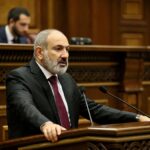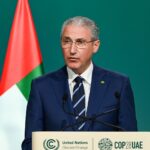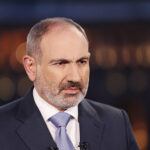The standoff began in early December, when the Russian peacekeeping contingent in the separatist Karabakh region denied access to Azerbaijani officials from the Ministry of Economy, Ministry of Ecology and Natural Resources and the state-owned mining company AzerGold CJSC from carrying out on-site inspections of the Gizilbulag gold deposits and the Demirli copper-molybdenum deposits to evaluate potential risks to the environment (Mfa.gov.az, December 13, 2022; Fed.az, December 16, 2022). While Azerbaijani state officials were deprived of free movement inside the separatist portion of Karabakh by the peacekeeping mission, it fueled skepticism in Azerbaijani and Armenian societies regarding Russia’s role in the process (Eurasianet, December 15, 2022).
In response to these restrictions, Azerbaijani environmental activists arranged a protest on the Shusha-Lachin road, where the Russian peacekeeping forces are deployed, accusing them of being overly friendly with the de facto separatist state in Khankendi (Stepanakert) (Eurasianet, December 15, 2022). As of January 2023, the eco-activists have continued their protest on the Lachin road, restricting most transportation and movement into separatist Karabakh from Armenia. Theydemand full access for Azerbaijani governmental institutions at every site in Karabakh, in acceptance of Baku’s internationally recognized borders.
However, the protests on the Shusha-Lachin road sparked criticism of Azerbaijan in the West, with France taking a staunchly pro-Armenian position, blaming the government in Baku for blocking the main road connecting Karabakh with Armenia, which in turn inflamed harsh anti-French sentiments within the Azerbaijani public (Azernews, December 9, 2022). However, despite the Western pressure on Baku to re-open the Lachin road, Azerbaijan is unlikely to retreat from its position until it has ensured full control over the road.
Indeed, the timing of the protests raised questions within both local and international media as to why similar protests had not occurred previously in the region (Eurasianet, December 29, 2022). The answer may be attributed to the failure of peace negotiations between Baku and Yerevan as initiated by the European Union and Russia in 2022. The EU’s attempts to facilitate further talks and prepare at least a draft version of a final peace agreement between Azerbaijan and Armenia have so far failed. Another key reason for the failure of the Brussels negotiation format was the anti-Azerbaijani resolution adopted by the French Senate in October 2022 and the French government’s vocal solidarity with Armenia, which added more fuel to the current standoff from Baku’s perspective (Armenian Weekly, November 22, 2022). With the diminishing role of the EU as a mediator in the peace negotiations, official Baku has started to employ alternative methods—namely civilian protests—to bring the attention of the international community to what it considers the illegalexploitation of natural resources in Karabakh.
With the EU’s failure to bring Baku and Yerevan closer to a peace agreement, the United States will likely increase its role in 2023 to prevent Russia from fully monopolizing the peace process (Commonspace.eu, January 6). US Senior Advisor for Caucasus Negotiations Philip Reeker retired from his position at the end of 2022, which gives Washington a chance to appoint a new and well-experienced negotiator with relevant regional experience, such as Michael Carpenter, who currently acts as the US ambassador to the Organization for Security and Co-operation in Europe, to head the process (Report.az, January 5).
However, the various estimates of international experts and scholars suggest that 2023 will not be a smooth year for the region. According to recent analysis, the South Caucasus will likely be plagued with other deadly hostilities, with the Iranian-Russian-Armenian grouping squaring off against the Azerbaijani-Turkish-Georgian arrangement (JAM-news, January 6). Whereas the uncertainty caused by Russia’s war against Ukraine promises to create new catalysts in the post-Soviet region, the occurrence of new conflicts in the South Caucasus threatens to create a deep security vacuum. Although it is hard to foresee the specifics of potential future conflicts in the region, it is fair to say that the region may witness another round of short-term fighting between Baku and Yerevan.
This prospect appears even more likely considering the recent press conferences of Armenian Prime Minister Nikol Pashinyan and Azerbaijani President Ilham Aliyev held on January 11 and 12, respectively (Armenian Weekly, January 11; President.az, January 12). Both conferences came at the peak of the standoff between Baku and Yerevan, with little chance of resuming the stalled negotiations. During the press conference, Pashinyan pointed out that the Russian peacekeepers’ inaction to events on the Lachin road did not give Armenia the security guarantees it has wanted but, on the contrary, has created a threat to Armenia’s security (Armenian Weekly, January 11; see EDM, January 19). Meanwhile, Aliyev, in his face-to-face interview with the local broadcasting service, emphasized that 2023 will be the last year for peace negotiations, declaring, “If they [the Armenians] are not interested, we do not need [negotiations] either” (Ayna.az, January 12). Such statements indicate that if the negotiations fail, another round of armed clashes in Karabakh will be inevitable in 2023.
Hence, Aliyev’s remarks should not come as a surprise, as the lack of a final peace treaty with Armenia stirs debates at home and complicates Baku’s relations with some leading Western countries, most notably France. Moreover, official Baku will likely seek a close partnership with Washington in the negotiation process, given Azerbaijan’s frequentcriticism of Russia and its support of Ruben Vardanyan, the incumbent state minister of the de facto separatist government in Karabakh.
Indeed, 2023 will be another uneasy year for Armenia and Azerbaijan in terms of peace negotiations. Seemingly, Azerbaijani protests on the Lachin road will continue until internal disputes within the separatist Karabakh region, namely between Ruben Vardanyan and Major General Vitaly Balasanyan, former head of the Russian Security Council sacked byVardanyan in early 2023, will heat up, enabling Azerbaijan to boost its influence and put an end to the alleged illegal mining in the region (Turan.az, January 7). If successful, such a scenario may trigger changes in Karabakh and throughout the entire region.
Fuad Shahbazov











